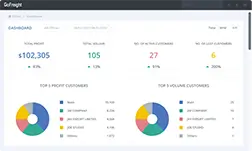What is a Fuel Surcharge?
A fuel surcharge, often abbreviated as FSC, is an additional fee that transportation service providers charge to cover the fluctuating costs of fuel. This surcharge is usually linked to the price of fuel and varies in proportion to changes in fuel prices. The primary purpose of the fuel surcharge is to allow freight carriers to adjust their rates to manage the uncertainty and volatility associated with fuel costs.
In the freight industry, where fuel is a significant operational expense, FSCs are a common practice. They are applicable to various modes of transportation, including Less than Truckload (LTL) and Full Truckload (FTL) shipments.
How will I be billed for a Fuel Surcharge?
Billing for a fuel surcharge is typically done in conjunction with the freight charges. The exact method of calculation can vary from one carrier to another but often involves a percentage of the base freight rate or a fixed rate per mile. This percentage or rate is usually derived from established fuel price indexes.
Carriers update the FSC rate regularly, often weekly or monthly, to reflect the current fuel prices. This approach ensures that both shippers and carriers can manage their expenses and revenues more predictably, despite fluctuations in fuel costs.
Related Freight Glossary Terms
- Less than Truckload (LTL)
- Full Truckload (FTL)

